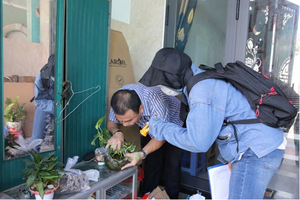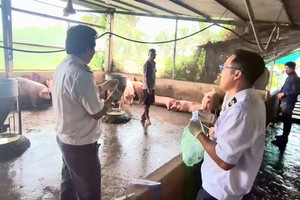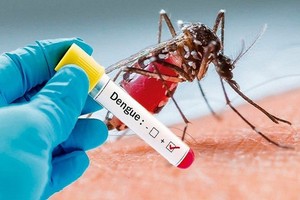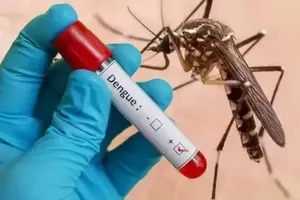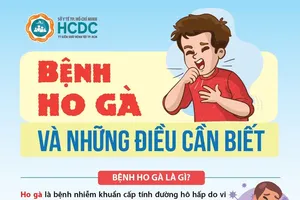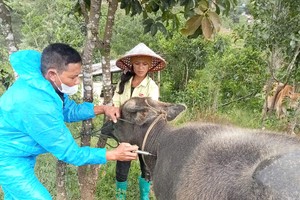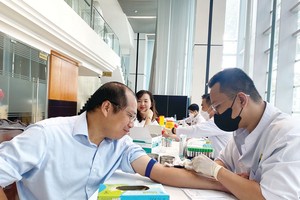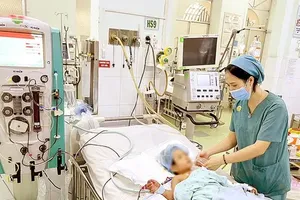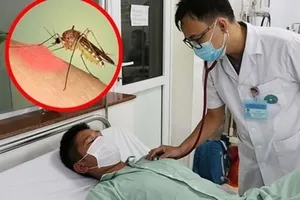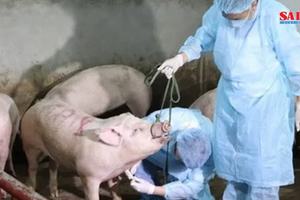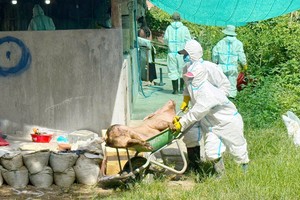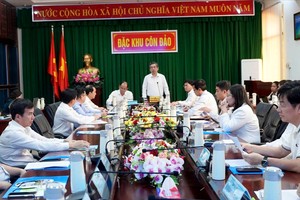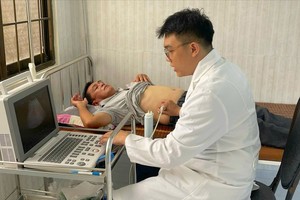Deputy Prime Minister Truong Vinh Trong yesterday highly appreciated the vital assistance and effective co-operation of the United Nations in helping Viet Nam prevent and control the spread of HIV/AIDS over the past years.
Speaking at the UN General Assembly High Level Meeting on HIV/AIDS in New York which began on Wednesday, Trong said, "With Viet Nam's great efforts, the number of HIV/AIDS patients accounts for only 0.26 per cent of the population and the country has also gained initial results in controlling the disease."
Over the past two years, the number of people who died of the disease dropped from 6,000 to 2,500 per year, he said.
Viet Nam's Law on HIV/AIDS Prevention and Control, and several other legal documents, encourages greater participation of people and social organisations in the fight against HIV through setting up more favourable conditions, he added.
The Vietnamese Government and people are strongly committed to realising national and international objectives which access and popularise HIV/AIDS prevention, treatment and care measures. They also support the UN's latest initiatives on no new HIV carriers, no discrimination and no death from HIV/AIDS, said the Deputy Prime Minister.
He also expressed his hope that Viet Nam will receive continued support and close and effective co-operation from the UN's member countries as well as international organisations.
Trong affirmed that HIV/AIDS is the biggest challenge in poor and developing countries, therefore, the international community should pay special attention and support HIV/AIDS prevention efforts in these countries.
He also emphasised an urgent need for comprehensive prevention measures, including education, communication and awareness improvement, particularly among young people.
HIV/AIDS patients should have access to better health care services, especially ART (antiretroviral therapy) and Methadone, he said, adding that the medicines should be produced at a low-cost through technological transfer and aid.
Meanwhile Secretary-General Ban Ki-moon called for global action Wednesday to put an end to AIDS by 2020 and relegate the killer disease to the history books.
Opening a three-day General Assembly meeting to assess progress in combating HIV/AIDS, the UN chief told presidents, ministers and diplomats from across the globe that if all partners involved in the fight unite "as never before" the goal can be met.
"Today, we gather to end AIDS," the secretary-general said. "That is our goal-zero new infections, zero stigma and zero AIDS-related deaths."
Ban recalled that world leaders first took responsibility for controlling the epidemic at a UN meeting in 2001, and since then new infections have declined by 20 per cent. Five years ago, leaders pledged that every individual would get services, care and support to cope with HIV and AIDS and since then AIDS-related deaths have fallen by 20 per cent, he said.
Michel Sidibe, executive director of the United Nations AIDS agency, told the leaders that the vision of an AIDS-free world can be realised.
However, he said it will require revolutionising HIV prevention and the mobilisation of young people "as agents of change" in reducing treatment costs. It will also require ending discrimination and providing lifesaving services to the groups most affected - migrants, prisoners, people who inject drugs, sex workers, and men who have sex with men, he said.
Sidibe said 1.8 million people die of AIDS every year in the developing world and in developed countries AIDS is becoming a chronic disease. He said 9 million people in the world await treatment.
Sidibe urged donors, who have reduced funding for AIDS for the first time in 10 years, to increase their contributions to meet the new goal.
"We cannot stop our investment now," he said. "With an effective up-front investment we can make the down payment to alter the costs trajectory and end this epidemic."
The UNAIDS chief said getting to zero will require new innovations to provide inexpensive diagnostic methods and medication available for everyone, everywhere in five years.
With sustained investment in research and development, he said, "we will have a microbicide that women can use to protect themselves from HIV and we will have a vaccine that will eradicate this virus".
According to new research by UNAIDS, an additional US$6 billion will be needed every year by 2015 to help avert 12 million new infections and more than seven million deaths by 2020.
Sharonann Lynch of Doctors Without Borders said "the world needs an ambitious treatment target with a plan attached to make it a reality - because it will be meaningless if countries aren't willing to come up with the cash and actions needed to break the back of the epidemic".
